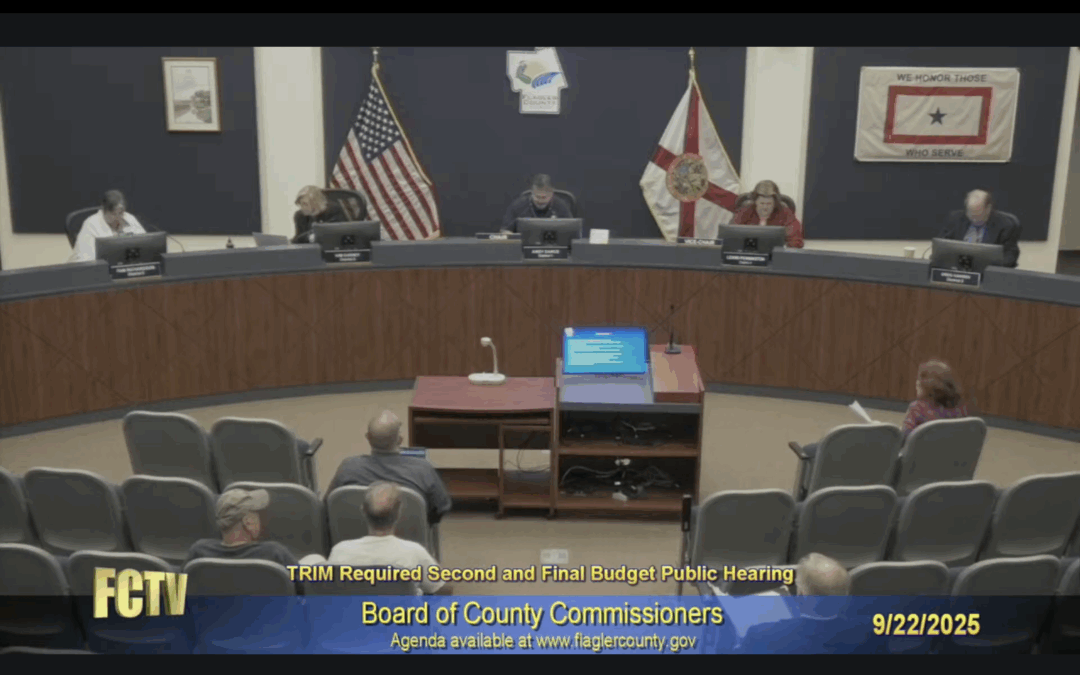Flagler County commissioners unanimously approved their final $335.7 million budget for fiscal year 2026 Monday evening, despite vocal public criticism over high administrative salaries and airport spending during the second and final budget hearing.
The approved budget maintains the same total as the tentative budget adopted September 11, with no changes made between the two required public hearings. Financial Services Director John Brower presented the final numbers, noting that the total millage rate of 8.180 mills actually represents a decrease of 0.0543 mills from the previous year’s rate of 8.2343 mills.
However, the operating millage rate of 7.9945 mills reflects a 4.98% increase over the calculated rollback rate of 7.6151 mills, requiring the county to advertise a notice of tax increase as mandated by state law.
Pay Plan Approved Without Changes
The commission began by approving the classification and pay plan for fiscal year 2026, which county Administrator Heidi Petito explained remains unchanged from the previous year except for eliminating one unused classification and incorporating union contract changes.
“We have not made any adjustments to the pay plan. We’ve kept it as it is,” Petito said, adding that staff plans to conduct a comprehensive salary study during fiscal year 2026 and return to commissioners with recommendations for a new pay plan.
Commissioner Hansen made a motion to approve the pay plan, which passed unanimously with no public comment.
Citizens Voice Strong Opposition
Multiple residents spoke against the budget during public comment periods, focusing primarily on what they characterized as excessive administrative salaries for a county serving 136,744 residents, 20,000 of them in unincorporated Flagler County.
Jane Gentile-Yaud of Plantation Bay led the criticism, questioning County Administrator Heidi Petito’s $208,000 salary and the sheriff’s $61 million budget, plus an additional $1.8 million for vehicle and building maintenance. “We’re paying Heidi Petito $280,000 almost to be an administrator over a county of 20,000 people,” Gentile-Yaud said. “I think the salaries that are causing our millage rate to go up are out of touch with reality, based on the size of this county.”
She also criticized the legal department’s budget of over $550,000 for three employees, plus an additional $110,000 in outside legal expenses, and questioned code enforcement collecting only $2,000 in fines while paying $100,000 in salaries.
Darlene Shelley of Palm Coast echoed concerns about salary levels, stating, “That kind of six-figure salary is something that you would see a president of a company or a CEO making and I don’t think that little Flagler County justifies that sort of salary when you look around and see the folks that you represent aren’t making a fraction of that kind of money.”
Airport Spending Draws Continued Criticism
Shelley also renewed her criticism of airport spending, citing $65 million spent so far, with another $14 million pending, and nearly $33 million in the current budget for what she called an unprofitable enterprise zone. She expressed concerns about lead emissions from piston aircraft, stating, “We know that there is no safe level for lead. We know that piston aircraft burn fuel that still contains lead that has not been allowed in cars beginning in the 70s.”
Rich Drogus, a Palm Coast resident, appealed for a rollback to the previous year’s tax rate, citing approximately $750 million in new construction revenue over the past two years. “There’s a lot of revenue that came in, and I’m having a hard time understanding that we are going to get taxed even more, even though you got all this revenue,” Drogus said, noting his fixed income status.
Commissioners Defend Budget Process
Commission Chair Andy Dance explained that the final hearing represents the culmination of a year-long budget process that begins in December, emphasizing that significant changes cannot be made at the final adoption stage due to statutory deadlines.
“This is the stage where everything has been tightened up, and by state law, we have deadlines to meet,” Dance said. “We’ve been preparing the budget for that entire nine-month process. The new fiscal year starts on October 1st.”
Commissioner Kim Carney, participating in her first budget cycle, detailed her efforts to scrutinize spending throughout the process. She said she submitted “five and a half pages of accounts that I felt were overbudgeted” and successfully challenged several expenditures, including denying a proposed 4% cost-of-living adjustment for staff, limiting it to 2%.
“We did not approve a 4% COLA, so staff were only given a 2% COLA,” Carney said. “Yes, I do believe there’s some fluff in there. Yes, I will be looking for it in 2027.”
Carney also clarified that while merit pay was initially removed from the budget, funding was set aside in reserves pending development of a new merit pay system by human resources staff.
Final Millage Rates Approved
The commission approved Resolution 2025-79 establishing final millage rates despite some public confusion about the actual rates. The resolution includes a general fund millage of 7.8695 mills, environmentally sensitive lands operating budget at 0.1250 mills, environmentally sensitive lands debt service at 0.0855 mills, and general obligation bonds for the judicial center at 0.1000 mills.
When resident Gentile-Yaud questioned the exact millage rate during public comment, Brower clarified that the 7.9945 mills figure represents the combined general fund operating millage and environmentally sensitive lands operating budget, as required by the Florida Department of Revenue for calculating rollback rates.
Budget Adoption Completed
Following approval of the millage rates, commissioners unanimously passed Resolution 2025-80 adopting the final budget. Brower then requested and received authorization for the county administrator to execute administrative documents required to complete the adoption process as mandated by Florida statute.
“The Flagler County Board of County Commissioners has completed the annual budget adoption process for fiscal year 2026. All requirements as mandated by Florida law have been met,” Brower announced after the final vote.
Additional Budget Details
During the discussion, Commissioner Carney mentioned the county’s participation in Florida’s “DOGE process,” referencing efficiency reviews being conducted statewide. She noted receiving comprehensive salary spreadsheets as part of this process and offered to share them with concerned residents.
The commission chair also mentioned an upcoming Bunnell city meeting regarding industrial zoning that could impact the western part of the county, noting that county staff had worked with Bunnell officials to address concerns about the proposed changes.
Flagler County provides essential services to all residents, including emergency management, emergency medical services (EMS), E911 communications, public safety support (800 MHz radio, CAD, fleet, and facility maintenance), public transportation, roadway infrastructure, libraries, and numerous community programs. In addition, the County funds the five Constitutional Offices — Sheriff, Clerk of Court, Property Appraiser, Supervisor of Elections, and Tax Collector.
Looking Ahead
Several commissioners emphasized that meaningful budget input must occur throughout the year-long budget process rather than at the final adoption hearings. Dance invited residents to participate in the county’s Citizens Academy beginning in January, describing it as an opportunity to learn about county operations and associated costs.
“It’s a really good opportunity to get a behind-the-scenes look at all the different departments,” Dance said. “You can talk budget with every single department that’s there.”
The meeting concluded with all budget-related items approved unanimously, setting the fiscal year 2026 budget at $335,772,213 with a total millage rate of 8.180 mills, effective October 1, 2025.




Thank you to Flagler Buzz for this realistic and fair editorial were the dedicated residentes speaking their 3 minutes about the FCBOCC Agenda items are treated with respect.